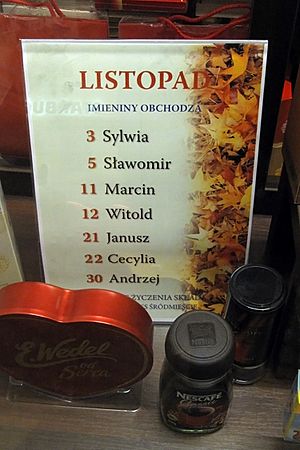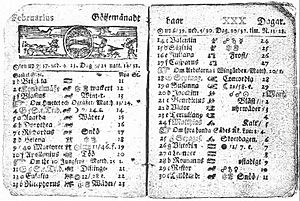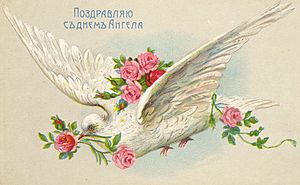Name day facts for kids
A name day is a special tradition in many parts of Europe and the Americas. It's a day each year linked to your first name, often the name you received at baptism. This name usually comes from a saint or a person from the Bible. In places where name days are popular, people celebrate both their name day and their birthday!
This custom started with the Christian calendar of saints. Believers named after a saint would celebrate that saint's special day. Name days are most common in countries where Catholicism, Lutheranism, and Orthodoxy are the main Christian groups. However, in some countries, name day celebrations don't have a direct link to Christian traditions anymore.
Contents
History of Name Days
Celebrating name days has been a tradition in Catholic and Eastern Orthodox countries since the Middle Ages. It also continued in some countries, like those in Scandinavia, even after they became Protestant. These days originally came from lists of holidays honoring saints and martyrs of the church. For example, the name Karl or Carl is celebrated in Sweden on January 28. This is the day Charlemagne (Charles the Great) died. The church encouraged celebrating name days over birthdays. Birthdays were once seen as a non-Christian tradition.
Today, official lists show which names are celebrated on which days. Different countries like Finland, Sweden, and Sámi countries have their own lists. But some names are celebrated on the same day in many places. The lists of name days have been updated over time, especially in Sweden and Finland since the 1700s.
Name Days Around the World
Bulgaria
In Bulgaria, name days (Bulgarian: имени дни) are almost always linked to Bulgarian Eastern Orthodox celebrations. Some names can be celebrated on more than one day. Some even follow traditions from other countries, like Valentina being celebrated on Catholic St. Valentine's Day.
Two very popular name days in Bulgaria are St. George's Day (Гергьовден) on May 6, and St. John's Day (Ивановден) on January 7. Another example is Tsvetnitsa (Цветница), also known as Palm Sunday. On this day, people with names from flowers, trees, or herbs celebrate. Name days are often connected to seasons. For instance, Dimitrovden (Dimitar's day) on October 26 marks the start of winter. Gergyovden (George's day) on May 6 marks its end, according to old traditions.
Name days in Bulgaria are very important and widely celebrated. Children often bring sweets and chocolates to school to share. An old Bulgarian custom says everyone is welcome on a name day; you don't need an invitation. Gifts are usually given. Common wishes include "May you hear your name from grandchildren and great-grandchildren!" (Да чуеш името си от внуци и правнуци!).
Croatia
In Croatia, a name day (Croatian: imendan) matches a date in the Catholic calendar. This is when a saint's day is celebrated. While birthdays are celebrated more often, name days are congratulated by more people. This is because many people know your name, but not always your birth date.
All names that match a saint's name, and their different versions, are celebrated. For example, if there are different forms of the name John in Slavic, Romance, or Germanic languages, all those names are celebrated.
Czech Republic
In the Czech Republic, each day of the year is linked to one or more personal names. People celebrate their name day (svátek or jmeniny) on the date that matches their given name. Name days are usually less important than birthdays for Czech people. However, name day parties can be held with friends or co-workers who share the same name. This can make the celebration bigger and more important.
In the past, parents had to choose a name from a specific list. This rule has changed, but it's still common to pick a name from the name day "calendar." The original list came from the Roman Catholic calendar of saints. But it has been updated to include names used today. Any name, Czech or foreign, can be given now.
Denmark
Danes have their own calendar for name days (Danish: navnedag). However, celebrating one's name day is almost unheard of in Denmark. Few Danes even know when their name day is.
Finland
Finns celebrate their name days (Finnish: nimipäivä, Swedish: namnsdag) based on a calendar from the University of Helsinki Almanac Office. Every day except New Year's Day, Christmas Day, and 29 February is a name day. Each day has names in both Finnish and Swedish. Often, these names are similar.
There are many old beliefs linked to different name days. These often involve the weather or the best times for farming tasks. For example, there's a saying that "Jaakko (James) casts a cold rock into the water." This means that on Jaakko's day, July 25, lake and sea waters start to get colder. This is often true. The seven days from July 18 to 24 are all women's name days. This period is known as "the women's week" (naistenviikko). People believe it's an especially rainy week, and statistics show this is somewhat true.
The Almanac Office updates the name lists every 5–10 years. They add new popular names and remove old ones that are no longer used. The University of Helsinki owns the copyright to these name lists. The Finnish Orthodox Church has its own calendar of name days, which follows Orthodox saints' feast days.
France
In France, name days (French: fête du prénom) have been very important in daily life for a long time. It was traditional to give a small gift to friends or family on their name day. Some days are commonly known by their saint's name. For example, "la Saint Sylvestre" is New Year's Eve. "La Saint Jean" is Midsummer (June 24).
Germany
In Germany, name days (German: Namenstag) used to be very popular in Catholic southern and western regions. Historically, they were even more important than birthdays there. But since the 1950s, this tradition has mostly faded, even in Catholic families.
Greece and Cyprus
In Greece and Cyprus, a name day (Greek: ονομαστική εορτή, romanized: onomastikí eortí, or γιορτή) is celebrated much like a birthday. However, there's no birthday cake. It's a strong Greek tradition for newborns to be named after a grandparent. This helps names continue through the family.
The Greek Orthodox Church dedicates every day to at least one saint or martyr. If you are named after a saint, there's a big celebration on your name day. Many Greek names come from ancient Greek traditions, not Christian saints. If a person has such a name, they might not have a name day. Or they might choose to celebrate on All Saints' Day. Most name days are on the same date every year. A few exceptions are names linked to Easter, so their dates change each year.
Greek calendars always include detailed name day lists. This makes it easy for people to know when to celebrate. Some name days are on major Christian holidays. For example, people named Chrēstos or Christine celebrate on Christmas. Those named after St. Basil celebrate on New Year's Day. Anastásios and Anastasía celebrate on Easter Sunday. María and Mários celebrate on the Dormition or the Presentation of Mary, mother of Jesus.
A name day celebration is often an open house. If a family decides to celebrate, all well-wishers are welcome. The host might provide a meal, drinks, desserts, music, and partying. Guests are expected to bring gifts. Sometimes, an adult relative or godparent might give pocket money to a child or teenager instead of a gift. If birthdays and name days are close, the celebrations are often combined. It's also common to move a name day celebration to a more convenient day, like the following Friday or a weekend. Name days can be celebrated up to 40 days after the actual date.
Hungary
Name days in Hungary are very popular, though not as much as birthdays. Women often receive flowers on their name day, even at work. The price of flowers can go up around popular name days because of high demand. A bottle of alcohol is a common gift for men. Children often bring sweets to school to celebrate. Name days are celebrated more often than birthdays at workplaces. This is probably because calendars list name days, making them easier to remember. Some very popular names have several name days. In that case, the person chooses which day to celebrate, usually the one closest to their birthday.
Ireland
In Ireland, name days were sometimes celebrated in the past. Among Roman Catholics, the celebration traditionally began the night before. People would say a part of the Rosary to ask the Virgin Mary and the child's patron saint for their needs.
Italy
In Italy, a name day is called an "Onomastico" (meaning "name"). People often get small gifts on their Onomastico. Cakes are also baked. Name days are decided by the Sanctorale, a list in the General Roman Calendar. This list gives almost every day a few saints. So, different names might be celebrated on the same day. Traditionally, parents choose their child's name day at christening. They pick their favorite saint if there are several with the same name on different days. The child keeps this name day for life. If a child has many given names, they usually celebrate only the first one. In Southern Italy, the onomastico is very important, sometimes even more so than a birthday.
Many churches used to celebrate their patron saint's name day. This included Mass, religious processions, and charity festivals. A festival like this might have a community meal, food stands, or a temporary amusement park. It could last a few days and is called a sagra.
Latvia
In Latvia, name days (Latvian: vārda dienas) are set on specific dates. Every day (except February 29 in a leap year) is a name day. Latvian calendars usually list up to five names for each day, totaling about 1,000 names a year. Recently, a larger calendar with about 5,000 names was published. There are also online calendars that list names even for February 29. February 29 and May 22 are popular days for people who don't have a name day listed. If your name isn't in a regular calendar, you can choose from several dates to celebrate. The Latvian name day calendar is updated every one or two years. Anyone can suggest a name for the calendar, usually by applying to the State Language Centre (Valsts valodas centrs).
Name day celebrations are very similar to birthday parties. It's common to celebrate name days at work. Usually, the person celebrating prepares snacks for well-wishers. Throughout the day, co-workers come with flowers, sweets, and small gifts to greet them. Sometimes, especially in smaller companies, a specific time is set for the main celebration. It's normal to come to a name day celebration without an invitation. At school, students celebrating are expected to bring candy for classmates and teachers. Celebrating name days at home is like a birthday party. You might eat cake with family and receive presents.
Some families might even celebrate name days more than birthdays. This happens if the name day falls during a nicer season. For example, they might throw a big party for a summer name day instead of a birthday in bad weather.
Mexico and Latin America
In Latin America, the onomastico is the day when a saint, after whom someone was named, is celebrated in the Catholic tradition. This term is often used to mean birthdays, but it actually refers to the saint's day. In the past, it was common to name a newborn after the saint of that day. So, a person's birthday might not be the same as their name day. For example, women named "Rosa" might celebrate their name day on August 23, the day of Saint Rose of Lima. Men named "Joseph" celebrate on March 19. For religious people, their saint's day can be more important than their own birthday.
North Macedonia
Name days (Macedonian: Именден) in North Macedonia have been celebrated for a long time. They share some similarities with other Balkan countries but also have unique ones. Name days follow the Macedonian Orthodox Church calendar, which uses the Julian calendar. Each month has several name days. Some name days are so important to the country's history and culture that they are non-working days for everyone. On these days, everyone is invited. A common saying is "Кој дојде – Добредојде" ("Whoever comes—is welcomed"). Bringing gifts is optional, usually wine or something small. A typical greeting is "Let your name last forever" ("Нека ти е вечно името").
Some of the most celebrated name days in North Macedonia include St. Stefan (January 9), Epiphany (January 19), St. John (January 20), St. George (May 6), and St. Dimitar (November 8). St. Nikola (December 19) is the most celebrated.
Poland

Traditionally, name day celebrations (Polish: imieniny) in Poland were more important than birthday celebrations. However, birthdays are becoming more popular, especially among younger people. Imieniny involve friends and family gathering at the celebrant's home. Gifts and flowers are given, both at home and at places like work. Local calendars often list the names celebrated on each day.
Romania
Name days (onomastica) in Romania are linked to Orthodox Christian saint celebrations. The celebrations are very similar to those in Greece. Name days are almost as important as birthdays. People named after a particular saint are celebrated on that saint's day. Some important name days include January 1: Sf. Vasile (St. Basil), January 7: Sf. Ioan (St. John), April 23: Sf. Gheorghe (St. George), and December 6: Sf. Nicolae (St. Nicholas).
People, especially women, who don't have a saint's name or only have a flower name, celebrate their name day on Palm Sunday. This day is called Floriile in Romanian, meaning "the Flowers Day." This name day changes each year and is celebrated on the last Sunday before Orthodox Easter.
Russia
Russians celebrate name days (Russian: именины, romanized: imeniny) separately from birthdays. Some calendars list name days, but usually, you need a special name-day calendar. Celebrations can be small, like giving cards and flowers, or big parties like birthdays. A celebration often starts with attending church services for that day. Before the October Revolution of 1917, Russians thought name days were as important as, or even more important than, birthdays. They believed baptism was a "new birth" in Christ.
The Russian Imperial family had a tradition of giving name-day gifts, such as diamonds or pearls. Name days are mentioned in famous Russian books and plays. For example, the first act of Anton Chekhov's Three Sisters is about Irina's name day.
Even though name day (именины) celebrations are not as popular as birthdays now, the Russian word for a person having a birthday (день рождения) is still именинник, which literally means "a person whose name day is being celebrated."
Slovakia
In Slovakia, name days (Slovak: meniny) are widely celebrated. Name days are often celebrated more than birthdays at workplaces. This is likely because most calendars list name days, making them easy to remember. You can also find them in daily newspapers. At elementary schools, the student celebrating gives candies to classmates. Within families, celebrations are like birthdays, with cakes, presents, and flowers. Flowers sometimes sell out for popular name days. In the past, there were rules about which names parents could choose. This has changed, but it's still common to pick a name from the calendar's name day list.
The original list came from the Roman Catholic calendar of saints. But it has been updated to include names used today.
Slovenia
Name days (Slovene: god) were widely celebrated in Slovenia and preferred over birthday celebrations. This changed after World War II and the start of Communism. In rural areas and among some city people, the custom lasted longer. Today, the tradition still exists, but name days are mostly celebrated by older people.
Spain
Until recently, name days in Spain (Spanish: onomásticos or día de mi/su santo) were widely celebrated. Onomásticos include not just saints but also different forms of the Virgin Mary. For example, a woman named Carmen would celebrate her name day on July 16, the day of Our Lady of Mount Carmel. Today, onomásticos are still remembered in more traditional families. But they are not generally celebrated with big parties and gifts as they used to be. To celebrate name days, practicing Catholics usually go to mass and have a small family gathering. In Spain, children often bring sweets or cake to school to share with their classmates.
Sweden
From the 1700s, names used by the royal family were added to the Swedish name day list. Then other common names followed. In 1901, the list was fully updated to include current names. The Royal Swedish Academy of Sciences used to have control over almanacs, but this ended in 1972. So did the official name day list. Different name day lists started to appear. But the 1901 official list was still widely used until 1986. That year, a new list with three names for each day was agreed upon. This list was changed in 1993 to have two names per day. However, many people were unhappy with it. So, the Swedish Academy created a new two-name list. This list was finally accepted and started being used in 2001. Even though it's not officially controlled like the older lists, it's now used everywhere in Sweden.
Ukraine
Name days in Ukraine (Ukrainian: день ангела, lit. 'angel's day') are usually linked to celebrations by the Ukrainian Orthodox, Ukrainian Orthodox (Moscow Patriarchate), and Ukrainian Catholic churches. They celebrate the day a saint was born.
See also
 In Spanish: Onomástico para niños
In Spanish: Onomástico para niños
- Calendar of saints
- Celebrate Your Name Week
- Slava (tradition)
- Swedish calendar
 | Sharif Bey |
 | Hale Woodruff |
 | Richmond Barthé |
 | Purvis Young |




